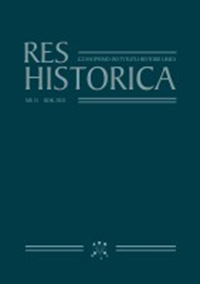Nie wszystko złe, co z epoki saskiej. Refleksje na temat ocen historiografii polskiej na przykładzie konfederacji tarnogrodzkiej
Not Everything That’s Bad Comes From the Saxon Era.
Reflections on the Evaluation of Polish Historiography
with the Example of the Tarnogród Confederation
Author(s): Arkadiusz KierysSubject(s): History
Published by: Wydawnictwo Naukowe Uniwersytetu Marii Curie-Sklodowskiej
Keywords: Confederation of Tarnogród; Polish-Saxon Union; August II the Strong; Stanisław Ledóchowski; Silent Sejm
Summary/Abstract: Critical evaluation of the reign of the Wettin dynasty in the Polish-Lithuanian Commonwealth dominated Polish historiography until the mid-20th century. August II the Strong was blamed for bringing the monarchy under the control of Peter I the Great, and the nobility for anarchizing political life – in a word, for the beginning of the collapse of the state. The study of the course of the Confederation of Tarnogród and the analysis of pacification talks between the Confederates and the King’s plenipotentiaries, based on Diariusz Konfederowanych na Kongresie Lubelskie de Anno 1716 (Diary of the Confederates at the Congress of Lublin, 1716), allowed for a revision of the previous views. The nobility of the day were not only aware of the need to repair the system and describe the offices (mainly those of the Hetman), but also saw the need to curb the increasing role of Russia in the mediation. The most intriguing issue related to the Tarnogród Confederation seems to be the attitude of the nobility towards religious dissidents – they stood up for their rights, opposing the Catholic hierarchy as well as the king himself.
Journal: Res Historica
- Issue Year: 2021
- Issue No: 51
- Page Range: 221-251
- Page Count: 31
- Language: Polish

